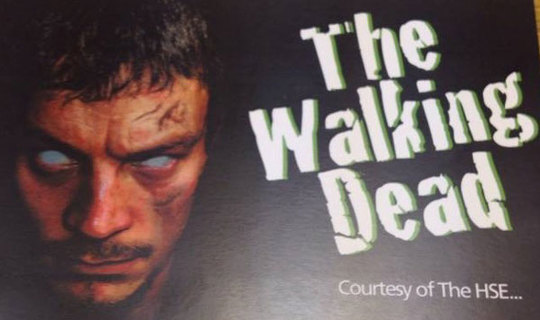Addicts depicted as ‘zombies’ in drug treatment clinic row
Dublin People 14 Nov 2014
THE chairperson of the Dun Laoghaire Rate Payers’ Association (DLRPA) has defended a decision to distribute controversial ‘zombie’ postcards to its members as part of a campaign to close down a local drug treatment clinic.
The cards, which depict a zombie-like character with the caption, ‘The Walking Dead…courtesy of the HSE’, were issued on behalf of the association in recent weeks. On the back of the card are a number of criticisms of methadone programmes in treating heroin addicts.
It calls on Minister for Health Leo Varadkar to close the Dun Laoghaire clinic, which is located on Patrick Street.
It states: “DLRPA would like to bring the following to your attention. The doctors in the Dun Laoghaire HSE drug distribution centre are administering 60 per cent more methadone than their European counterparts.
“Your Dun Laoghaire HSE drug distribution centre keeps patients, through no fault of their own, in a catatonic state indefinitely.”
The Patrick Street treatment centre is one of a number of locations in HSE Dublin Mid-Leinster that provides a specialised service for those struggling with drug addiction.
The centre first opened in 1996 and there are 94 service users currently attending the clinic for methadone substitution treatment, while a further 64 clients attend the clinic for other interventions including counselling, prescriptions and rehabilitation services.
However, the location of the clinic has remained a contentious issue over the years. The no-nonsense cards, while attracting some sharp criticism, have also been seen by some as necessary to draw attention to a perceived problem posed by drug addicts in the town.
Cllr Jennifer Cuffe, who is a member of the Dun Laoghaire Drugs Task Force, criticised the “negative tactics” employed by the DLRPA and said the cards were “absolutely disgusting”.
“This is an attempt to place the blame of Dun Laoghaire town’s issues squarely at the feet of a small minority by dehumanising and scaremongering,” she stated.
“The false concern they seem to express for service users in the leaflet is in sharp contrast to their blatant attempt to scapegoat recovering addicts that attend the clinic.
“Drug use and addiction do have negative consequences on wider society but no more than the devastating consequences they have on the individuals and their families. DLRPA and others may not agree with the presence of a drug treatment clinic in Dun Laoghaire but their attempt to pin the blame for Dun Laoghaire’s problems through demonising those unable to defend themselves is pathetic.”
However, a defiant Peter Kerrigan of the DLRPA said he was standing over the publication of the controversial card.
“To be honest with you, I’m more surprised than anything at the reaction to the cards,” he said. “I don’t understand why people are getting caught up with these cards. What about the 100 plus poor individuals who are being pumped up with methadone and then left to wander around the streets of Dun Laoghaire?
“Clearly this method of treating addictions and addicts has failed and yet the HSE insists on persisting with it.
“It’s a disgrace. In fact, I wouldn’t be surprised if at some point in the future an inquiry is held into how these people are being treated.”
The DLRPA argue that addicts would be better treated through counselling and long-term rehabilitation.
“These patients clearly need some form of therapy to assist them,” it stated. “The same people are attending the clinic each week and for the last 15 or more years.”
The associaton added: “Patients attending the Patrick Street clinic are provided with methadone without the very important concomitant intense counselling.
“They are then allowed leave the clinic and most local businesses, residents and visitors report that the patients usually remain in the vicinity of the clinic.
“The residents, workers and businesses in Dun Laoghaire are entitled to live, work and generally go about their everyday lives without fear.”
The HSE said the centre’s primary focus was on rehabilitation and treatment. It insisted it has helped many individuals over the last 18 years of the centre’s operation.
“Dosages prescribed are entirely within the normal range and all appropriate safeguards are put in place providing treatment,” the HSE said in a statement.
“The HSE is committed to the delivery of treatment services in accordance with the National Drugs Strategy (2009 – 2016).
“All treatment is individualised to the needs of the patient. There are a range of statutory services and interventions available to those suffering from addiction.
“Engagement in treatment interventions has a positive impact on the individual in terms of improved health, relationships and ability to participate in training, education and employment.
“Families benefit from their significant others being in treatment and achieving greater stability in their life. Equally, the benefits to the community include less crime and anti-social behaviour associated with illicit drug use, greater contribution to the community and improved public health.”











